Special New Faculty Welcome Issue
Welcome to these faculty members who have joined us in recent months:
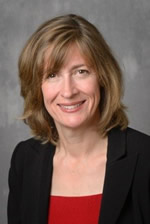 Melinda “Mindy” Appold, Assistant Professor, Horticulture and Landscape Architecture. Mindy received her bachelor’s degree in landscape architecture from The Ohio State University and her master’s degree in landscape architecture from Cornell University, where she was also honored as an Outstanding Teaching Assistant in the College of Agriculture and Life Sciences. She is excited to bring her 20 years of practice as a registered landscape architect for prominent design studios, as well as her own design firm, into the classroom to teach and mentor the next generation of designers. Mindy is teaching Planting Design this semester. She is thrilled to return with her husband and two active boys to the Midwest, where she grew up and still has deep family roots. Melinda “Mindy” Appold, Assistant Professor, Horticulture and Landscape Architecture. Mindy received her bachelor’s degree in landscape architecture from The Ohio State University and her master’s degree in landscape architecture from Cornell University, where she was also honored as an Outstanding Teaching Assistant in the College of Agriculture and Life Sciences. She is excited to bring her 20 years of practice as a registered landscape architect for prominent design studios, as well as her own design firm, into the classroom to teach and mentor the next generation of designers. Mindy is teaching Planting Design this semester. She is thrilled to return with her husband and two active boys to the Midwest, where she grew up and still has deep family roots.
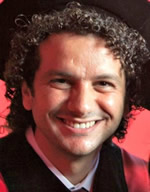 Shady Atallah, Assistant Professor, Forestry and Natural Resources. Shady holds bachelor’s and master’s degrees in agricultural sciences from the Université Saint-Esprit de Kaslik in Lebanon and a master’s degree in plant science from the American University of Beirut. He earned a master’s degree in agricultural and resource economics and a postgraduate certificate in postharvest biology and technology, both from the University of California, Davis. Shady recently completed his doctorate in applied economics at Cornell University. He has worked as an agricultural engineer and project officer for international NGOs in Lebanon and as a Middle East agriculture specialist for the international programs of the University of California, Davis. At Purdue, Shady’s research and Extension programs are in natural resource economics with a focus on sustainable forest ecosystems and associated ecosystem services. Shady has a courtesy appointment with the Department of Agricultural Economics. He will be teaching Natural Resource Economics in the spring. Shady Atallah, Assistant Professor, Forestry and Natural Resources. Shady holds bachelor’s and master’s degrees in agricultural sciences from the Université Saint-Esprit de Kaslik in Lebanon and a master’s degree in plant science from the American University of Beirut. He earned a master’s degree in agricultural and resource economics and a postgraduate certificate in postharvest biology and technology, both from the University of California, Davis. Shady recently completed his doctorate in applied economics at Cornell University. He has worked as an agricultural engineer and project officer for international NGOs in Lebanon and as a Middle East agriculture specialist for the international programs of the University of California, Davis. At Purdue, Shady’s research and Extension programs are in natural resource economics with a focus on sustainable forest ecosystems and associated ecosystem services. Shady has a courtesy appointment with the Department of Agricultural Economics. He will be teaching Natural Resource Economics in the spring.
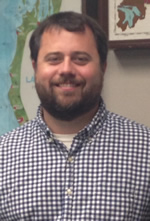 Paris Collingsworth, Research Assistant Professor, Forestry and Natural Resources. Paris earned a bachelor’s degree in biology from Samford University, a master’s degree in zoology from Southern Illinois University and a doctorate in evolution, ecology and organismal biology from The Ohio State University. He also did post-doctoral research at the US Geological Survey and the Cooperative Institute for Limnology and Ecosystems Research in Ann Arbor, Michigan. His research focuses on ecosystem dynamics in the Laurentian Great Lakes, using ecological and statistical models to develop a mechanistic understanding about how anthropogenic and natural stressors impact ecosystem structure and function. Current projects include identifying environmental factors that influence prey fish populations in Lakes Michigan and Huron, identifying sources of variation in the relationship between total phosphorus and chlorophyll concentrations in Lake Erie, determining the ecological effects of temporal and spatial variation of the deep chlorophyll maximum in Lake Ontario, and exploring the spatial extent and ecological effects of hypoxia in Lake Erie. Paris Collingsworth, Research Assistant Professor, Forestry and Natural Resources. Paris earned a bachelor’s degree in biology from Samford University, a master’s degree in zoology from Southern Illinois University and a doctorate in evolution, ecology and organismal biology from The Ohio State University. He also did post-doctoral research at the US Geological Survey and the Cooperative Institute for Limnology and Ecosystems Research in Ann Arbor, Michigan. His research focuses on ecosystem dynamics in the Laurentian Great Lakes, using ecological and statistical models to develop a mechanistic understanding about how anthropogenic and natural stressors impact ecosystem structure and function. Current projects include identifying environmental factors that influence prey fish populations in Lakes Michigan and Huron, identifying sources of variation in the relationship between total phosphorus and chlorophyll concentrations in Lake Erie, determining the ecological effects of temporal and spatial variation of the deep chlorophyll maximum in Lake Ontario, and exploring the spatial extent and ecological effects of hypoxia in Lake Erie.
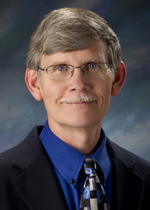 Tom Creswell, Clinical Engagement Assistant Professor, Botany and Plant Pathology and Director, Plant and Pest Diagnostic Laboratory. Tom received his bachelor’s degree in botany and a master’s in plant pathology from Auburn University. He earned a doctorate in plant pathology from North Carolina State University, where he served as the managing director of the Plant Disease and Insect Clinic for 20 years. Tom has been with Purdue University for six years, serving as the director of the Plant and Pest Diagnostic Laboratory (PPDL). His expertise is in the area of diagnostics of ornamental plants, vegetables, fruits and turf. Tom manages the PPDL staff, budgets and laboratory operations and provides training in diagnostics to Extension field staff, growers and students. He has developed a plant pathology curriculum and provided training to plant protection faculty from eight Afghanistan universities and has trained specialists in Afghanistan’s Ministry of Agriculture, Irrigation and Livestock in Kabul and Herat in plant disease diagnostic methods and laboratory management standards. Tom has also assisted the USDA Foreign Agriculture Service in Belize and is currently working on projects in Bangladesh and Grenada. His recent collaborations include working with 10 other diagnostic labs to develop a wide range of online diagnostic resource materials for use by Extension personnel and diagnosticians. Tom Creswell, Clinical Engagement Assistant Professor, Botany and Plant Pathology and Director, Plant and Pest Diagnostic Laboratory. Tom received his bachelor’s degree in botany and a master’s in plant pathology from Auburn University. He earned a doctorate in plant pathology from North Carolina State University, where he served as the managing director of the Plant Disease and Insect Clinic for 20 years. Tom has been with Purdue University for six years, serving as the director of the Plant and Pest Diagnostic Laboratory (PPDL). His expertise is in the area of diagnostics of ornamental plants, vegetables, fruits and turf. Tom manages the PPDL staff, budgets and laboratory operations and provides training in diagnostics to Extension field staff, growers and students. He has developed a plant pathology curriculum and provided training to plant protection faculty from eight Afghanistan universities and has trained specialists in Afghanistan’s Ministry of Agriculture, Irrigation and Livestock in Kabul and Herat in plant disease diagnostic methods and laboratory management standards. Tom has also assisted the USDA Foreign Agriculture Service in Belize and is currently working on projects in Bangladesh and Grenada. His recent collaborations include working with 10 other diagnostic labs to develop a wide range of online diagnostic resource materials for use by Extension personnel and diagnosticians.
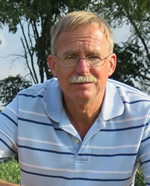 Daniel Egel, Clinical Engagement Associate Professor, Botany and Plant Pathology. Dan earned his bachelor’s degree from Miami University, a master’s degree from Purdue and a doctorate from the University of Florida. Dan has statewide responsibilities for vegetable disease Extension and research. His current interests include Fusarium wilt of watermelon, fungicide resistance of foliar pathogens and management of vegetable diseases in greenhouses. Dan is involved in the production of several publications, including his role as lead author of the Midwest Vegetable Production Guide for Commercial Growers. Dan works at the Southwest Purdue Agricultural Center in Vincennes. Daniel Egel, Clinical Engagement Associate Professor, Botany and Plant Pathology. Dan earned his bachelor’s degree from Miami University, a master’s degree from Purdue and a doctorate from the University of Florida. Dan has statewide responsibilities for vegetable disease Extension and research. His current interests include Fusarium wilt of watermelon, fungicide resistance of foliar pathogens and management of vegetable diseases in greenhouses. Dan is involved in the production of several publications, including his role as lead author of the Midwest Vegetable Production Guide for Commercial Growers. Dan works at the Southwest Purdue Agricultural Center in Vincennes.
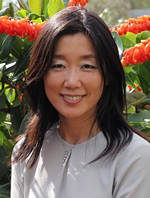 Hye-Ji Kim, Assistant Professor, Horticulture and Landscape Architecture. Hye-Ji earned a bachelor's degree in horticultural science from Korea University in South Korea, a master's degree in biological sciences from Shizuoka University in Japan, and a doctorate in horticulture from Pennsylvania State University. Before coming to Purdue, she was a research associate at Cornell University and assistant professor of sustainable ornamental crop production at the University of Hawaii at Manoa. Her research focuses on the understanding of the internal and external controls of plant growth and development to improve the performance of horticultural crops in multiple production systems. Her research interests include the establishment of sustainable horticultural production systems through reduced water, nutrient and chemical inputs, and reduced water/nutrient runoff while maximizing crop productivity; root zone environment control to enhance root architecture and increase stress tolerance of crops; alternative horticultural cropping systems for sustainable crop production; off-season crop production through cultivar selection or cultural practices; and new crop development. Hye-Ji will be teaching Plant Propagation. Hye-Ji Kim, Assistant Professor, Horticulture and Landscape Architecture. Hye-Ji earned a bachelor's degree in horticultural science from Korea University in South Korea, a master's degree in biological sciences from Shizuoka University in Japan, and a doctorate in horticulture from Pennsylvania State University. Before coming to Purdue, she was a research associate at Cornell University and assistant professor of sustainable ornamental crop production at the University of Hawaii at Manoa. Her research focuses on the understanding of the internal and external controls of plant growth and development to improve the performance of horticultural crops in multiple production systems. Her research interests include the establishment of sustainable horticultural production systems through reduced water, nutrient and chemical inputs, and reduced water/nutrient runoff while maximizing crop productivity; root zone environment control to enhance root architecture and increase stress tolerance of crops; alternative horticultural cropping systems for sustainable crop production; off-season crop production through cultivar selection or cultural practices; and new crop development. Hye-Ji will be teaching Plant Propagation.
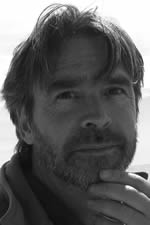 Damon Lisch, Associate Professor, Botany and Plant Pathology. Damon earned his bachelor’s degree from the University of California, Santa Cruz and his doctorate from the University of California, Berkeley. He did postdoctoral research at the University of Arizona, where he studied the evolutionary consequences of transposable element activity in plants and animals, and the relationship between paramutation and regulation of transposons. He then spent several years at U.C. Berkeley as a professional researcher and a National Science Foundation primary investigator studying the evolution and epigenetic regulation of Mutator transposons in maize. Damon is interested in the means by which transposable elements are recognized and silenced as well as the short and long-term consequences this process has had on plant gene regulation, domestication and evolution. He will continue to use Mutator transposons as a model system for understanding these processes in maize and related crop species. Damon Lisch, Associate Professor, Botany and Plant Pathology. Damon earned his bachelor’s degree from the University of California, Santa Cruz and his doctorate from the University of California, Berkeley. He did postdoctoral research at the University of Arizona, where he studied the evolutionary consequences of transposable element activity in plants and animals, and the relationship between paramutation and regulation of transposons. He then spent several years at U.C. Berkeley as a professional researcher and a National Science Foundation primary investigator studying the evolution and epigenetic regulation of Mutator transposons in maize. Damon is interested in the means by which transposable elements are recognized and silenced as well as the short and long-term consequences this process has had on plant gene regulation, domestication and evolution. He will continue to use Mutator transposons as a model system for understanding these processes in maize and related crop species.
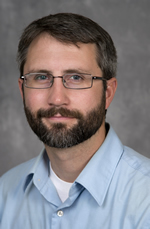 Jeremy Lohman, Assistant Professor, Biochemistry. Jeremy received his bachelor’s degree in biochemistry from Washington State University and his doctorate degree in chemistry from the University of Oregon for studying structural rearrangements in the active sites of two proteins. He conducted postdoctoral research at the University of Wisconsin-Madison and the Scripps Research Institute, where he studied the biosynthesis of antibiotics and anticancer agents (natural products) produced by Actinobacteria. Jeremy’s research focuses on understanding the molecular evolution of enzymatic catalysis in enzymes from bacterial biosynthetic pathways. He aims to reprogram the substrate specificity of the biosynthetic enzymes to produce natural product derivatives with therapeutic properties superior to their natural counterparts. Jeremy Lohman, Assistant Professor, Biochemistry. Jeremy received his bachelor’s degree in biochemistry from Washington State University and his doctorate degree in chemistry from the University of Oregon for studying structural rearrangements in the active sites of two proteins. He conducted postdoctoral research at the University of Wisconsin-Madison and the Scripps Research Institute, where he studied the biosynthesis of antibiotics and anticancer agents (natural products) produced by Actinobacteria. Jeremy’s research focuses on understanding the molecular evolution of enzymatic catalysis in enzymes from bacterial biosynthetic pathways. He aims to reprogram the substrate specificity of the biosynthetic enzymes to produce natural product derivatives with therapeutic properties superior to their natural counterparts.
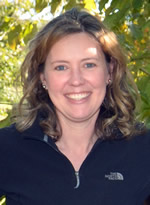 Sara McMillan, Assistant Professor, Agricultural and Biological Engineering. Sara received her bachelor’s and master’s degrees in civil and environmental engineering from the University of Iowa, and her doctorate in environmental science and engineering from the University of North Carolina, Chapel Hill. Before joining Purdue, she was an assistant professor in the Department of Civil and Environmental Engineering at UNC Charlotte. Her research focuses on hydrology and biogeochemistry of coupled human and natural systems, particularly utilizing ecological engineering solutions to improve water quality. Her current research projects include understanding the impact of geomorphology on nutrient retention in restored streams; characterizing hyporheic flowpaths in streams and their impact on nutrient cycling; and investigating the effects of best management practices in agricultural and urban watersheds on ecosystem function in receiving streams. Sara McMillan, Assistant Professor, Agricultural and Biological Engineering. Sara received her bachelor’s and master’s degrees in civil and environmental engineering from the University of Iowa, and her doctorate in environmental science and engineering from the University of North Carolina, Chapel Hill. Before joining Purdue, she was an assistant professor in the Department of Civil and Environmental Engineering at UNC Charlotte. Her research focuses on hydrology and biogeochemistry of coupled human and natural systems, particularly utilizing ecological engineering solutions to improve water quality. Her current research projects include understanding the impact of geomorphology on nutrient retention in restored streams; characterizing hyporheic flowpaths in streams and their impact on nutrient cycling; and investigating the effects of best management practices in agricultural and urban watersheds on ecosystem function in receiving streams.
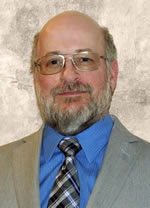 Robert M. Stwalley III, Assistant Clinical Professor, Agricultural & Biological Engineering. Robert received his bachelor’s degree in agricultural and biological engineering (power and machinery) and his master’s and doctorate in mechanical engineering (combustion and computational fluids), both from Purdue. He spent significant time in industry, as a consultant, and as a renewable energy entrepreneur. He has worked on numerous technical IP’s throughout his career and has led several industrial organizations. He is the former Director of the Professional Practice Program for Purdue University. His research interests include renewable energy technologies, urban agriculture techniques, specialized agricultural machinery design, aquaculture systems, CO2 sequestration technologies, and hydroponic systems. Robert teaches Crop Production Equipment, Design of Off-Road Vehicles, and the Senior Capstone Experiences in ABE. Robert M. Stwalley III, Assistant Clinical Professor, Agricultural & Biological Engineering. Robert received his bachelor’s degree in agricultural and biological engineering (power and machinery) and his master’s and doctorate in mechanical engineering (combustion and computational fluids), both from Purdue. He spent significant time in industry, as a consultant, and as a renewable energy entrepreneur. He has worked on numerous technical IP’s throughout his career and has led several industrial organizations. He is the former Director of the Professional Practice Program for Purdue University. His research interests include renewable energy technologies, urban agriculture techniques, specialized agricultural machinery design, aquaculture systems, CO2 sequestration technologies, and hydroponic systems. Robert teaches Crop Production Equipment, Design of Off-Road Vehicles, and the Senior Capstone Experiences in ABE.
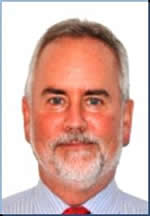 Dominique van der Mensbrugghe, Research Professor and Director of the Center for Global Trade Analysis (GTAP), Agricultural Economics. Dominique earned his undergraduate degree in mathematics at the Université Catholique de Louvain in Belgium and a doctorate in economics from the University of California, Berkeley. Prior to joining Purdue, he worked at the Food and Agriculture Organization of the United Nations, the World Bank, and the Organisation for Economic Co-operation and Development (OECD). The focus of his work during his career has been on long-term structural change of the global economy and the analysis of global economic policy issues including agricultural policies, regional and multilateral trade agreements, demographics and international migration, the Millennium Development Goals, and climate change. His work has appeared frequently in various economic journals and the agencies’ flagship reports and he is an expert on global computable general equilibrium modeling. Dominique van der Mensbrugghe, Research Professor and Director of the Center for Global Trade Analysis (GTAP), Agricultural Economics. Dominique earned his undergraduate degree in mathematics at the Université Catholique de Louvain in Belgium and a doctorate in economics from the University of California, Berkeley. Prior to joining Purdue, he worked at the Food and Agriculture Organization of the United Nations, the World Bank, and the Organisation for Economic Co-operation and Development (OECD). The focus of his work during his career has been on long-term structural change of the global economy and the analysis of global economic policy issues including agricultural policies, regional and multilateral trade agreements, demographics and international migration, the Millennium Development Goals, and climate change. His work has appeared frequently in various economic journals and the agencies’ flagship reports and he is an expert on global computable general equilibrium modeling.
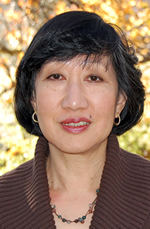 Hazel Wetzstein, Professor and Head, Horticulture and Landscape Architecture. Hazel earned her bachelor’s degree in biology from California State University and a doctorate in Botany from the University of California-Davis. Before coming to Purdue, she was a professor of horticulture at the University of Georgia, where she was also on the faculty in the School of Forest Resources. Before that, she was a member of the biological sciences faculty at the University of Nevada. Hazel’s research emphasis has been in plant growth and development, reproductive biology, conservation and tissue culture, and medicinal plants. Hazel Wetzstein, Professor and Head, Horticulture and Landscape Architecture. Hazel earned her bachelor’s degree in biology from California State University and a doctorate in Botany from the University of California-Davis. Before coming to Purdue, she was a professor of horticulture at the University of Georgia, where she was also on the faculty in the School of Forest Resources. Before that, she was a member of the biological sciences faculty at the University of Nevada. Hazel’s research emphasis has been in plant growth and development, reproductive biology, conservation and tissue culture, and medicinal plants.
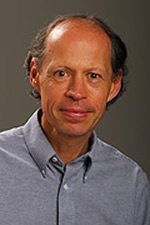 Michael Wetzstein, Professor, Agricultural Economics. Michael received his bachelor’s degree in economics from California State University and a master’s and doctorate from the University of California-Davis. Prior to joining the Purdue faculty, he was the Josiah Meigs Professor in the Department of Agricultural and Applied Economics at The University of Georgia. He is a recent recipient of the USDA National Teaching Award and has served as editor for a number of leading discipline journals. His primary research focus is on applied microeconomic theory with emphasis on natural resource and environmental impacts upon agricultural production policy. This research focus complements his teaching in applied microeconomics, which resulted in textbook publications. Current research focus is on policy evaluation and adoption of renewable natural resources. Michael Wetzstein, Professor, Agricultural Economics. Michael received his bachelor’s degree in economics from California State University and a master’s and doctorate from the University of California-Davis. Prior to joining the Purdue faculty, he was the Josiah Meigs Professor in the Department of Agricultural and Applied Economics at The University of Georgia. He is a recent recipient of the USDA National Teaching Award and has served as editor for a number of leading discipline journals. His primary research focus is on applied microeconomic theory with emphasis on natural resource and environmental impacts upon agricultural production policy. This research focus complements his teaching in applied microeconomics, which resulted in textbook publications. Current research focus is on policy evaluation and adoption of renewable natural resources.
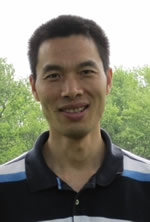 Cankui Zhang, Assistant Professor, Agronomy. Cankui began his higher education in biology and earned his doctorate in horticulture from Auburn University. He served as a research associate at Cornell University before joining Purdue. His interest in plants and agriculture in general originates from his farming background in central China. His research interests include carbon and mineral transport in the phloem, long distance signaling in plants under stress conditions, and uptake of gaseous pollutants by plants. His goal is to use fundamental knowledge in plant biology to improve the quality and production efficiency of crops. Cankui Zhang, Assistant Professor, Agronomy. Cankui began his higher education in biology and earned his doctorate in horticulture from Auburn University. He served as a research associate at Cornell University before joining Purdue. His interest in plants and agriculture in general originates from his farming background in central China. His research interests include carbon and mineral transport in the phloem, long distance signaling in plants under stress conditions, and uptake of gaseous pollutants by plants. His goal is to use fundamental knowledge in plant biology to improve the quality and production efficiency of crops.
|